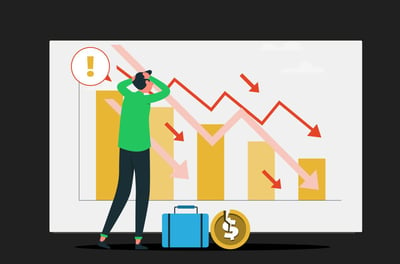Table Of Contents
- Was the 2023 Situation Different from the 2008 Global Financial Crisis?
- What Investors Do In A Crisis
- How Do Bank Collapses Affect Investors?
- What Do Collapses Mean for Traders?
- Should Traders Sell Their Stocks and Convert to Cash?
- The Safest Place to Put Your Money During a Financial Crisis
- Economic Implications From the Bank Crisis
- Best Advice For Traders
- Find Undervalued Nonbank Financial Stocks
- Taking Advantage of a Crisis
- Betting on a Crisis to Happen
- The Bottom Line
Bank Failures and What They Mean to Investors and Traders
If you've been an active investor for any length of time, you will have witnessed the struggles of certain banks around the world. The global banking system is generally stable, but occasionally one or more banks collapse, sending jitters through the markets. In 2023, it was impossible to ignore the headlines about the collapse of Silicon Valley Bank (SVB) in the United States and Credit Suisse in Switzerland. These events caused widespread fear in financial circles worldwide. In this article, we will focus on the year 2023 as it featured some high profile bank failures.
The impact of these bank collapses was not limited to just these two banks. Other banks, like First Republic Bank in the United States, also experienced runs as concerned customers who had dealings with Silicon Valley Bank worried about the safety of their deposits. These high-profile bank failures prompted many, including retail investors, to question the safety of banking systems worldwide.
So, how should the average investor view the bank failures? Given the magnitude of these banking collapses, we need to step back and consider how they affect the market, ordinary people, and other banks. In this article, we will delve into the phenomenon of bank collapses and examine the specific circumstances that lead to them. Then we will explore the broader implications these collapses have for stock traders and investors who trade on the major indices.
The 2023 banking turmoil was triggered by overleveraged institutions like SVB but did not freeze the financial system as severely as the 2008 crisis.
Behavioral finance shows that traders often make emotional decisions during crises which can amplify losses unless a clear trading plan is followed.
Bank failures tend to spark global market volatility due to the interconnectedness of financial systems and institutional reaction to risk.
Diversifying your portfolio and researching financial institutions is critical as banks and brokers can collapse in similar ways.
Traders can benefit from crisis-driven volatility using price action strategies that focus on reacting to market movement rather than prediction.
Short selling and options strategies like buying puts can help traders profit from downturns but require careful timing and emotional discipline.
Safe havens such as gold bonds and high-yield savings accounts offer conservative alternatives during financial instability.
Some excellent brokers through which to increase your investing diversity include ICM, XTB, IG, Markets, and Dukascopy, each offering tools and access to diversify and manage risk in unstable times.
Was the 2023 Situation Different from the 2008 Global Financial Crisis?
Yes, it was very different. The 2023 situation, despite the speed at which stock prices fell, was quite different from what led to the global financial crisis in 2008. While there were negative economic and market consequences resulting from a shortage of available funds in 2023, it didn't cause a complete freeze in the financial system like in 2008.

Back in 2008, the crisis was triggered by banks not knowing the extent of losses on each other's balance sheets. As a result, managers overseeing credit-counterparty risk on trading desks stopped trading with other banks out of fear of a phenomenon known as "jump-to-default risk," which meant the risk that the other bank could default in the near future. This caused commercial paper markets to freeze, interbank lending to stop, and trading activities to grind to a halt.
What was different in 2023 was that banks didn't have the same significant holes in their balance sheets as they did back then. Prior to the 2008 credit crisis, banks took on bad quality mortgages with impunity. When the housing bubble burst, these assets were worth almost nothing.
What Investors Do In A Crisis
Investors do not always act in the predictable way that traditional financial theory suggests, where each person is expected to make rational decisions to maximize their own benefit. In reality, people often behave irrationally and let their emotions influence their choices, especially during times of economic turmoil. This is where the field of behavioral finance comes into play—it aims to explain how people actually behave, rather than how financial theory predicts they should.
Behavioral finance says that people are not simply risk-averse, but they are actually more averse to losses. This means that the emotional pain caused by a loss is felt much more intensely than the pleasure gained from a profit. Not only that, but loss aversion also describes the tendency for people to sell their winning investments too early and hold onto their losing investments for too long.
When people are making money, they tend to become cautious and avoid taking risks. However, when they're losing money, they often become more willing to take on additional risks in the hope of recovering their losses.
What does this mean for traders? Let's take the example of a blackjack player at a casino. When the player is on a winning streak, they might start playing it safe, betting smaller amounts in order to protect their winnings. However, if that same player is losing money, they may start taking greater risks by doubling down or betting more on riskier hands, hoping to break even. Investors exhibit similar behavior. Unfortunately, taking on excessive risk when experiencing losses tends to only make those losses even worse in the end. This applies equally during a banking crisis. That's why, whatever your financial asset, you must always develop a trading plan and stick to established trading strategies, while ignoring the urge to deviate from your plan.
How Do Bank Collapses Affect Investors?
The collapse of SVB served as an important reminder of the need for thorough research when investing in financial institutions. It was and always is a rough lesson for investors, highlighting the inherent risks involved in investing and the potential impact of one institution's failure on the entire industry. To mitigate such risks, it's crucial for investors to diversify their portfolios and carefully assess the financial strength and stability of any institution before making investment decisions.
So, what led to SVB's collapse? In a familiar story, the bank found itself overleveraged and using customer deposits to invest in risky assets that ultimately turned bad. As word of the bank's financial troubles spread, a bank run followed, ultimately leading to its collapse. This underscores the importance of prudent management and responsible investment practices to maintain stability and protect the interests of both traders and investors. Remember, retail trading brokers act in similar ways to banks as they take your deposits and re-invest them, so brokers can, and have, failed for much the same reasons as banks.
What Do Collapses Mean for Traders?
What impact does a bank collapse have on traders? You can expect increased volatility and a wider range of price movements. At this point, you may be asking, how can the failure of a regional bank in the US affect your stock investments on an Asian bourse like the Nikkei Average? The truth is the financial world is deeply interconnected. Institutional traders have their eye on world financial events and their portfolio managers will move investments around at the first sign of risk. This is why jitters in a faraway market can be felt in your local stock market.
For traders, this kind of event can actually be advantageous. One of the great aspects of being a trader is that you don't have to accurately predict how things will unfold. Your main focus is simply reacting to the price movements.
Traders rely on a method called price action analysis, which involves studying the basic price movements of a security to identify potential trade entry and exit points. This approach is considered reliable and does not heavily rely on indicators or fundamental factors. Instead, it primarily looks at the historical price patterns of the security being traded. By observing and interpreting these price movements with tools like moving averages, traders can make informed decisions about when to enter or exit trades.
Should Traders Sell Their Stocks and Convert to Cash?
Cash plays a crucial role in a portfolio by providing funds for short-term goals and immediate expenses. While it's natural to feel a sense of unease during market downturns, it's generally not advisable to sell off all your assets and shift entirely to cash.
Historically, stocks have shown a strong tendency to outperform cash over the long term. This is primarily because the value of cash tends to erode due to inflation, especially during periods of high annual price increases. On the other hand, the stock market, such as the S&P 500 index, has typically surpassed inflation over extended periods.
When it comes to making investment decisions, each individual investor should carefully consider their own risk tolerance and investment objectives. Ultimately, finding the right approach for your portfolio requires thoughtful consideration and professional advice to ensure alignment with your financial goals.
The Safest Place to Put Your Money During a Financial Crisis
If a volatile stock market makes you apprehensive about using it as a means to preserve and grow your wealth, rest assured that many others share your concerns. This presents an excellent opportunity to explore the safest investment options available to protect your money.
There are several avenues for investment that offer relatively low risk while still providing a modest return. These include high-yield savings accounts, bonds, and even safe havens like gold.
Each of these investment options comes with its own set of advantages and potential risks. It is crucial for you to conduct thorough research and consider your own risk tolerance and investment objectives before deciding where to allocate your wealth.
By performing due diligence and assessing your risk profile, you can make informed choices about the best places to store your money and achieve your investment goals. Remember to take into account the potential rewards and risks associated with each option to make a well-informed decision.
Recommended Brokers
Economic Implications From the Bank Crisis
Best Advice For Traders
Let's start by assessing your comfort level with potential losses. Ask yourself if you would be able to sleep well at night if the stock market were to drop to serious lows on the back of a banking crisis. If the answer is yes, then your current investment allocations may not need any major changes. However, if the thought of such a decline keeps you up at night, it might be a good idea to reassess your investment needs, strategy, and time horizon.
Next, keep an eye out for market imbalances that could present opportunities for tactical adjustments within your overall investment portfolio. One such adjustment is to rebalance your portfolio by giving more weight to both value and growth categories, as they are currently offering attractive investment prospects compared to the core/blend category, which is trading closer to fair value. If you're comfortable with taking on higher risk in pursuit of potentially higher rewards, consider small-cap stocks, as they are currently trading at a greater margin of safety based on their market capitalization.
For those who invest in individual stocks, now is a good time to search for undervalued stocks that have been unjustly affected by the recent turmoil in the financial sector. For example, many nonbank financial companies have been dragged down along with regional banks, even though they operate under different business models and don't rely heavily on deposit funding. Examples of such companies include investment banks and brokers, asset managers, credit card providers, and fintech firms.
Remember, it's important to carefully analyze and consider your options based on your own investment preferences and goals.
Find Undervalued Nonbank Financial Stocks
This could be a favorable moment to give more weight to sectors that are currently trading at a significant margin of safety. Sectors like communications, such consumer industries as retail and hospitality, and real estate might present attractive opportunities for investment.
When selecting companies in which to invest, prioritize those with a track record of high quality. These are companies that not only have the ability to weather economic challenges but also possess long-term competitive advantages that can sustain them in the face of financial crises or market disruptions. Investing in such companies can potentially yield favorable results even during uncertain times.
Taking Advantage of a Crisis
While investors are right to feel anxious as asset prices decline, those who remain calm can see this as an opportunity to buy assets at discounted prices. Purchasing assets from fearful individuals who are selling can be like taking advantage of a sale. Often, fear causes asset prices to drop well below their actual worth, but patient investors who wait for prices to normalize can potentially profit as prices rebound to their expected levels. Successfully investing during a crisis requires discipline, patience, and sufficient liquid assets to make strategic purchases.
During times of calamity, markets tend to anticipate the worst and stocks suffer the consequences. However, historical data shows that when the dust settles and optimism returns, prices tend to bounce back, responding to fundamental signals rather than perceived turmoil. A study conducted by Ned Davis Research analyzed 28 global crises over the past century, ranging from World War II to terrorist attacks like 9/11. In each case, markets overreacted and experienced sharp declines, only to recover soon afterward. Those who sold based on fear found themselves needing to buy back their portfolios at higher prices, while patient investors reaped the rewards.
Similar patterns can be observed after other geopolitical events. Recognizing the tendency for markets to overreact, astute investors can seize the opportunity to acquire stocks and other assets at attractive prices.
It's important to note that investing during a crisis is not limited to stock markets. The great recession, for example, led to a collapse in home prices as the housing market bubble burst. Many homeowners faced foreclosure due to unaffordable mortgages, and numerous properties had negative equity, with mortgage amounts exceeding the property's value. Homebuyers and real-estate investors capitalized on this situation by acquiring valuable assets at below-normal prices. As the housing market stabilized and recovered, they enjoyed substantial returns. Additionally, astute investors, known as "vulture investors," took advantage of recessions to acquire financially sound companies at reduced valuations.
After the great recession came a six-year-long bull market. Those who resisted panic saw their portfolios not only recover but also expand their gains. On the other hand, those who sold during the downturn and waited until the bull market was well underway to reinvest are still trying to recover from their losses.
Remember, investing during a crisis extends beyond stocks and offers opportunities in various asset classes. By understanding the tendency for markets to overreact, investors can make strategic decisions and potentially benefit from favorable returns.
Betting on a Crisis to Happen
Another way to profit from a crisis is by speculating that one will happen. Short-selling your chosen financial asset or using short equity index futures allows investors to make money when the market is experiencing a downturn. Short sellers borrow instruments they don't own and sell them, hoping to buy them back at a lower price later. This is a tough strategy to enact as, in truth, who can predict the next banking crisis?
Options strategies, such as buying puts that increase in value when the market falls or selling call options that expire worthless if they end up out of the money, can also be used to capitalize on a declining market. Similar strategies can be applied to bond and commodity markets.
However, some investors may have limitations on short selling or lack access to derivative markets. Even if they do have access, emotional biases, a normal part of human trading psychology, might discourage them from short selling. Additionally, short sellers may be forced to close their positions at a loss if markets rise instead of falling, leading to margin calls.
For individuals who simply want to protect themselves from a crisis without necessarily speculating on its occurrence, owning a well-diversified portfolio that includes investments across different asset classes with low correlations can help soften the impact. Those who have access to derivative markets can also use hedging strategies, such as a protective put or covered call, to reduce the severity of potential losses.
The Bottom Line
From time to time, the economy experiences crises like recessions and depressions. In the 20th century alone, there were approximately twenty identifiable crises, not counting events like wars or terrorist attacks that also led to sudden drops in markets. It's important to recognize that during these times, people tend to panic and make irrational decisions, contrary to what traditional financial theory suggests. However, those who remain calm, maintain discipline, and understand that markets have historically recovered from such events can take advantage of the situation by buying assets at discounted prices and potentially earning higher returns.
For those who anticipate an impending crisis, implementing short strategies can be a way to profit from a declining market. However, it's crucial to have good timing. Buying too early or too late, or holding onto a short position for too long, can result in additional losses and potentially hinder potential gains.






